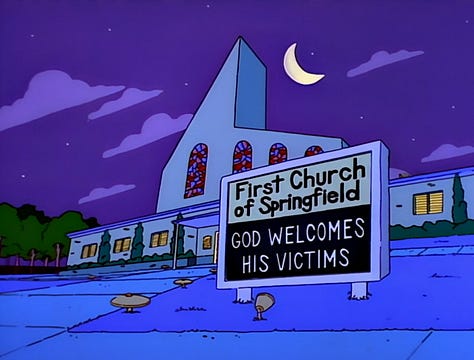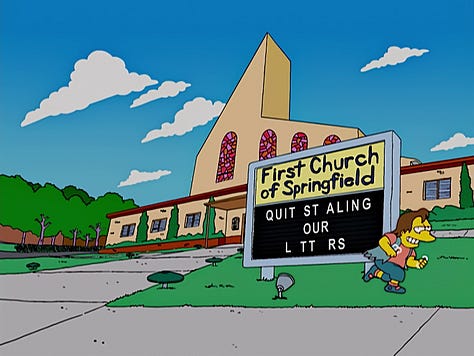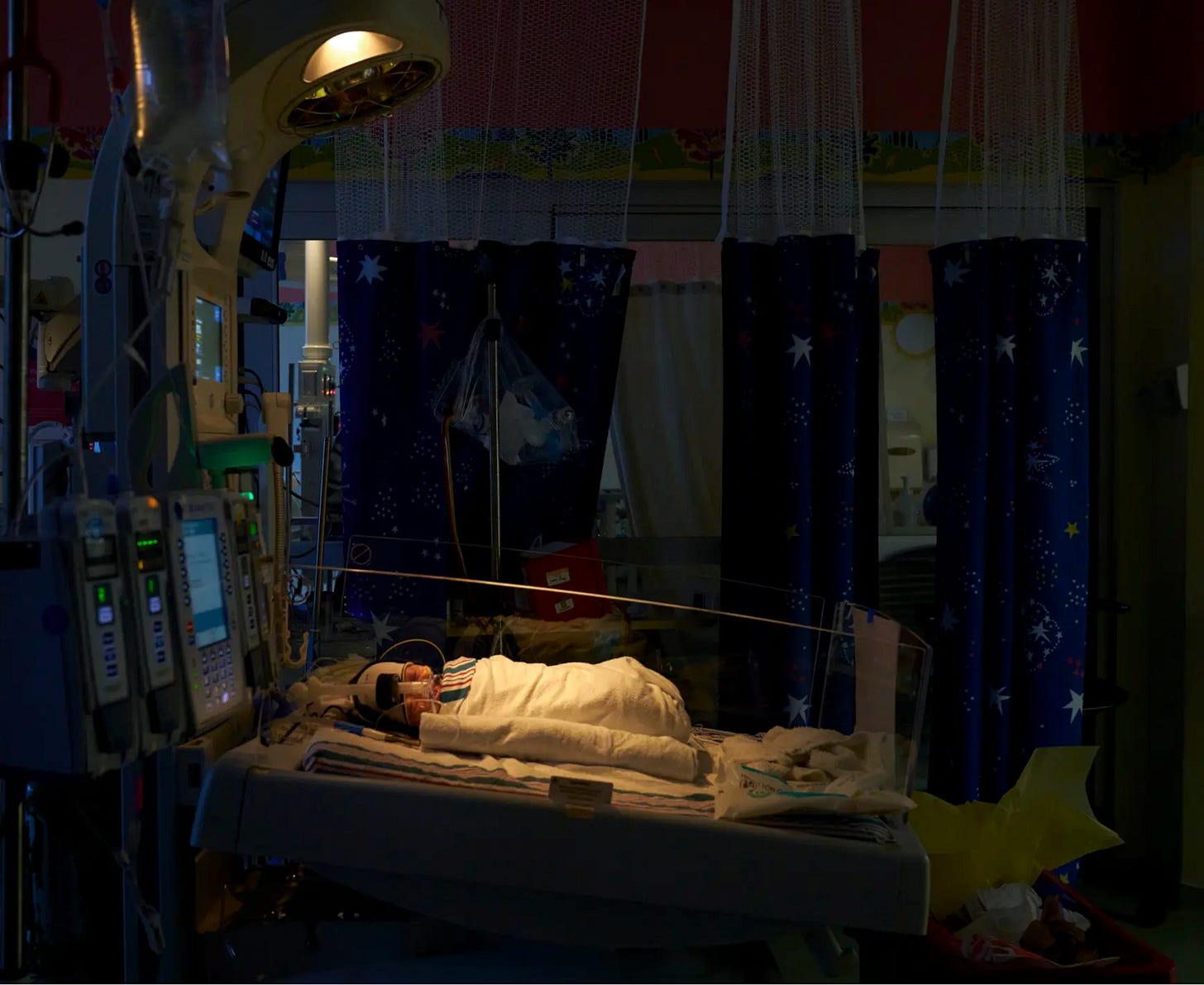Curious Reads: A Pro-Life Vote Isn't Pro-Life Enough
After surviving a life-threatening pregnancy in a state that banned all abortions, follow one family's harrowing journey through their infant's first year.
Hello friend, Liz here.
#1 Today’s top of the fold story is a year in the life of a family denied an abortion—that is, journalists followed a family in Tennessee for a year as they dealt with the aftermath of a life-threatening pregnancy that nearly killed mother and daughter.
“Tennessee law prohibits women from having abortions in nearly all circumstances. But once the babies are here, the state provides little help. We followed one family as they struggled it make it.”
I am pro-life. And I found this story incredibly heartbreaking and enraging. If you want to develop your empathy by spending a few minutes in another person’s life, I recommend you sit with this story.
Read “The Year After a Denied Abortion” at ProPublica by Stacy Kranitz and Kavintha Surana
The Highlights:
Mayron Hollis was three years sober, alongside her husband Chris, also in recovery, when they got the news of the pregnancy.
Her past addiction had led child protective service to remove three of her children from her care, and she was currently fighting to keep her infant daughter, Zooey. She and her husband worked demanding jobs. He installed vinyl house siding, while she installed fiberglass insulation. They’d been working to restore order in their home since gaining control of their addictions, but it had been a slow road.
Amid this, the Supreme Court overturned the Rowe v. Wade ruling and Mayron discovered that, not only was her pregnancy high risk, but that it was life threatening. Her fetus had implanted in uterine scar tissue from a past caesarean birth, which meant that as the baby grew, her scar could rupture, killing her and her baby at any time. Having an abortion in Tennessee was not an option and would result in Mayron being charged with a felony. The family was stuck.
Finally, at 26 weeks and 2 days, Mayron entered the hospital, bleeding. Mayron had been bleeding so much, in fact, that “her husband slipped in her blood,” and their daughter, Elayna, was delivered three months early by cesarean section. She weighed 1 pound 12 ounces. For months, Elayna remained in the neonatal intensive care unit at a hospital an hour’s drive from her parents and toddler sister before she was strong enough to go home.
Meanwhile, Mayron’s health had been dire; on the operating table, doctors had removed her uterus in order to prevent any future life-threatening pregnancies like the one she’d just endured. Yet she had to return to working 10-hour shifts soon after surgery since neither she nor her husband had paid parental leave.
The state’s Medicaid program did cover their extensive medical bills. But the family still had legal bills with which to contend. And once daughter Elayna arrived home, her complex medical needs meant that mom Mayron needed to quit working to care for her, limiting the family’s income further.
At this point, the state of Tennessee should have made social services available to the family, but the processes for receiving such services and emergency funding remained opaque to the parents. Sometimes, help from state agencies arrived too late; but mostly, help never came at all.
The family found themselves deeply in debt because “the new financial needs were crushing.”
The story continues from here, becoming more dire with every paragraph. (Not surprising, just heartbreaking.)
The gist: the family is unable to receive the care they need, the extra social services they depend upon, or to make any progress toward financial stability. This puts strain on their marriage and both parents’ sobriety.
As of the publication of this story, just after Elayna’s first birthday, the family is still struggling.
By the way, you can help this family right now! Donate to the family’s Go Fund Me:
Of course, this story is so hard to read. Over and over, you watch these church-going, recovering parents trying and trying and trying to make their lives work. Yet they’re thwarted at every turn. They live in a state that claims Christian values, that declares itself so pro-life that they’ve banned abortion almost entirely. But this family cannot navigate a system of funding that they would qualify for to make their lives bearable. Even their food stamps eventually run out. And they find themselves backed into a corner, their backs against the wall.
(Have I mentioned that I yearn for the writings of Dr. Howard Thurman to inform our politics more directly? Is anyone listening?)
I wonder, how would Jesus treat this family? What would genuine, Christlike love look like?
Pro-life policy means nothing if it’s only legislation, only rule-making. Holding the line is insufficient. Pro-life must mean more.
It must include paid parental leave, especially for those on the edge of the poverty line. It must include childcare for working families who have no choice but to work multiple jobs to pay their bills. It must include programs that support those parents in recovery and those whose children have special needs, and these programs must be free and easily accessible.
As church people and as a society, we must help these families to make it through some of the most tender seasons of their lives. These postpartum months are the most fragile in a family’s lifespan.
Politics aside, these parents and children are dearly loved by God. As Christians, to ignore their suffering is to ignore Godself.
Remember Jesus’s words in Matthew 25? Those who clothe the impoverished, feed the hungry, and adopt the orphan understand the nature of God. Those who ignore the sick, imprisoned, and thirsty? God never knew them, and they never knew God (Matthew 25:31-46).
In fact, God calls the ones among us who are needy, guilty, and desperate “these brothers and sisters of mine” (Matt. 25:40). There are no qualifications. Are you down and out? Then you’re in the family. Jesus calls you sister and brother. No exceptions.
Strike that—the one exception I see from the mouth of Jesus is the man or woman who walks by and does nothing to help. These are the first to pass by before the Samaritan bends toward the beaten up man.
So which one will we be?
Thanks for reading. Warmly, Liz Charlotte Grant
More Curious Reads

#2 “I have been an onion peeler and an excavator. I hope God will make me into a bridge.” If you had describe your spiritual life in metaphor, what image would fit? —the Christian Century

#3 You can learn how to appreciate museum art, even when it makes no sense to you. —Vox

#4 “Remember that time when we were hypnotized on stage as teenagers?” The live performance of hypnosis for comedy is hilarious…but might be dangerous. —Longreads









#5 What denomination is The Simpsons’ church? —Relevant Magazine
I never watched The Simpsons as a kid (‘cause it was suspect by most evangelical leaders), but now that my husband and I have been watching on our own, I’m struck by how much church and church talk is in the show! Which made me curious…to which branch of American Christianity do the Simpsons belong?
Cringeworthy…
Thanks to Ramona Grigg for pointing out that a certain newspaper unpublished this cartoon this week. Oof, this world.






